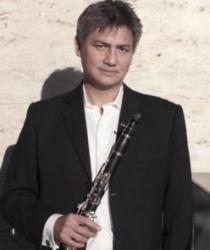
If you’re after musical prodigies, people of the stamp of Mozart or Yehudi Menuhin, you’re better off looking among the ranks of strings players. So says Anthony Pike, principal clarinet with the English Chamber Orchestra (ECO) and one of Britain’s most versatile and in-demand clarinettists. “You need bigger hands to play wind instruments properly,” he explains, “while violinists can start at almost any age. I actually wanted to learn the guitar, but was told to learn the clarinet instead, and while I was at Dunhurst, I was taught by an extraordinarily inspirational woman called Victoria Lyons.”
Anthony’s memories of his Bedales teachers are not confined to the remarkable Ms Lyons. “Well she was very like a number of my other teachers in that she was never condescending, never talked down to you and never pushed you in a direction that you weren’t ready to go,” he recalls. “She was a hard taskmaster, but we were all regarded with the same encouraging eye. It was a similar story with someone like David Butcher, with whom you were making adult furniture and by whom you were treated in an adult fashion. I’ve still got a couple of pieces that I made with him that have withstood the rigours of adult life.”
The son of a diplomat and born in Seoul, South Korea, Anthony boarded at Bedales from a young age. “I think of life back then as almost two distinct parts – the staff-related one and the one that you enjoyed with your peers,” he reflects. Five years after starting to learn the clarinet, Anthony was a finalist in the BBC Young Musician of the Year competition, but he was reluctant to acknowledge, or believe in, his talent fully at that stage. “There was some suggestion that I might leave school at 16, but I certainly never regretted staying on,” he remembers. “It gave me the chance to go on to Oxford, where I studied PPE and made some wonderful friends. In many ways, I felt that it was an extension of my life at Bedales.”
I actually think that my time at Bedales was ideal preparation for my professional life. I was exposed to so many different kinds of music while I was there and the idea of going with the flow is one that has always suited my temperament
Still Anthony hesitated about his choice of career. “I really fancied the idea of life in academia, but I also wanted to study the clarinet with Thea King at the Royal College of Music,” he says. “Dame Thea’s name had often come up during lessons with Victoria Lyons, who worshipped her, and it was largely because of her that I eventually went. At the beginning of Block 4 at Bedales, in fact, Vicky Lyons had decided that it was time to step aside as my teacher, and contacted Thea in the hope that she would have time to take me on, which she didn’t. However, Thea recommended her ECO colleague at the time, Julian Farrell, an Old Bedalian with whom I studied for many happy and fruitful years. Towards the end of my time at the RCM, and completely by chance, I ran into an old friend who had overfilled his schedule and suggested that I might like to stand in for him. That’s where my career really began.”
To say that Anthony’s subsequent output has been varied would be hugely to understate the case. Appearances with symphonic orchestras, chamber music enterprises and recitals at Wigmore Hall and scores of great venues around the world have underpinned Anthony’s status as a leading performer of the classical canon. However, his work has encompassed virtually every part of the musical spectrum, including playing on albums by Roxy Music, Joni Mitchell and Bjork, featuring on film soundtracks such as the Harry Potter series, the James Bondmovies and Atonement, and touring an orchestral version of Lou Reed’s albumBerlin with the man himself. “Touring with Lou Reed was an unbelievable experience,” Anthony reminisces happily. “He may not like journalists much, but he was tremendous to play with. I remember looking around on the Tube, seeing lots of commuters everywhere and thinking: ‘I’m touring with Lou Reed and you’re not’! Great fun.”
Such a peripatetic lifestyle is part of the job description and Anthony accepts that life as a freelance musician can have its difficulties. “The thing is that the longer you’re a freelance, the harder it becomes to take orders from other people,” he laughs. “I actually think that my time at Bedales was ideal preparation for my professional life. I was exposed to so many different kinds of music while I was there and the idea of going with the flow is one that has always suited my temperament.”
It would be fair to describe Anthony’s view of the attitude of successive UK governments to music as a less than rapturous one. “No votes in culture, are there?” he begins darkly. “The Prime Ministers of the past 40 years have tended to be Philistines, who regard classical music as a minority interest. Orchestras have lost their subsidies, so they’re forced to put on a more low-brow kind of offering in order to pay for what they actually exist to provide. In many ways, it’s down to the way music has developed in this country. In Germany, virtually every town of any size has its own orchestra; the same is true in the US, even in cities that have been hit as hard by the financial crisis as Pittsburgh. It’s a universal thing and people are immensely proud of it. I’m not sure that we have that sense of civic pride over here. Too many places don’t even possess the basic building blocks of music, of which I’m reminded whenever the ECO undertakes outreach work into some of the more deprived areas of this country.”
Anthony pauses for a moment. “It may be that we have too many music colleges churning out just a few too many impeccably trained musicians,” he offers. “I’m not sure. It’s not that I have a profound fear of music dying out forever in this country. Opera will always do alright, apparently. There seems to be a limitless supply of people prepared to dress up to the nines and spend enormous sums of money. Music isn’t just about opera, though.” More than once, Anthony’s thoughts return to the school that first nurtured his own musical talent. “By the time I left Bedales, I’d spent more than half my life there,” he says. “Not long ago, I did a season at Grange Park (based in Northington, Hampshire) and we took a rented house not far from Bedales. It felt exactly as though I had returned home.”
The music business continues to experience its share of casualties in the prevailing economic climate, notably in the West End. Is Anthony likely to continue his pursuit of the freelance life? “My wife and I are in fact two freelance musicians and she has occasionally suggested to me that it might be a good idea if one of us actually got a job!” he reports. “If a salaried post came my way, I’d be duty bound at least to consider it.”
Anthony Pike was interviewed by James Fairweather in February 2013.
